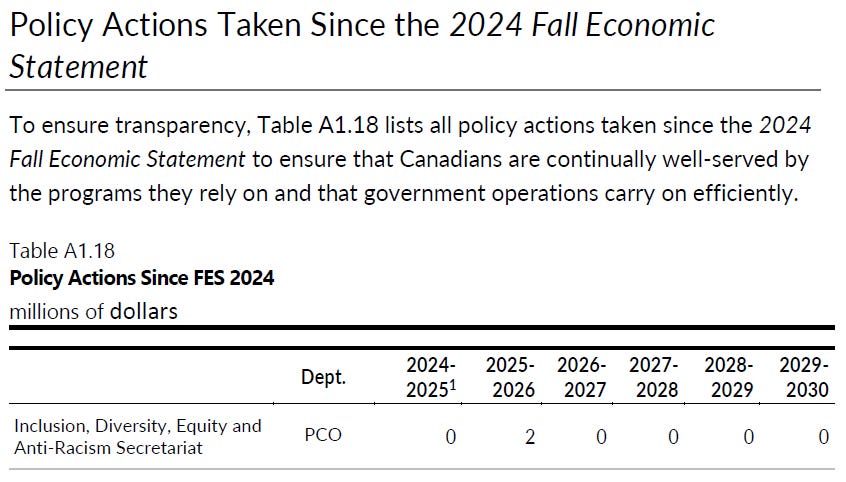Budget expands DEI requirements across federal programs
The federal government’s 2025 budget has vastly expanded its diversity and inclusion agenda, forcing DEI compliance into funding and oversight rules, even for programs once based strictly on merit.
The federal government’s 2025 budget has vastly expanded its diversity and inclusion agenda, forcing DEI compliance into funding and oversight rules, even for programs once based strictly on merit.
The federal government has allocated $2 million in Budget 2025 to support the Inclusion, Diversity, Equity and Anti-Racism (IDEA) Secretariat, a unit originally established in 2023 within the Privy Council Office. The secretariat was launched with $1.5 million over two years in Budget 2023 to develop and oversee an internal anti-racism strategy, led by a newly appointed chief diversity officer.
Over the summer, the office was reorganized as the “Central Agencies IDEA Secretariat” to coordinate DEI policy and performance tracking across Canada’s central agencies, but it does not have explicit regulatory authority over other federal departments.
The funding is a one-year line item, with no further explanation in the main chapters.
This shift reflects a broader trend in federal policy, where DEI frameworks are increasingly embedded in the approval process for government spending. The budget confirms that 53 per cent of all new federal measures are now screened through Gender-Based Analysis Plus. Departments are expected to identify and address barriers related to gender, race, disability, and geography by including “responsive approaches” in their program designs.
Other programs listed in the budget extend DEI criteria into areas that were previously merit-based. One example is Elevate IP, a federal program that funds business accelerators and incubators to help Canadian startups access intellectual property services such as patents, trademarks, and legal support.
The 2025 budget directs Elevate IP recipients to develop and implement formal Inclusion, Diversity, Equity and Accessibility (IDEA) action plans. These plans, which target under-represented groups, are now part of the eligibility for funding. Earlier program materials emphasized inclusive access but did not contain a comparable IDEA requirement.
The Youth Climate Corps, announced for the first time in this budget, provides $40 million for paid skills training in “climate emergency and recovery response” and “climate resilience.” The program will provide 175,000 placements through Canada Summer Jobs, the horizontal Youth Employment and Skills Strategy, and the Student Work Placement Program next year.
Because farm operators are “predominantly older White men,” the budget proposes that Farm Credit Canada, a federal Crown corporation, adjust its $1 billion lending fund and review practices to “better align with the specific needs of under-represented groups such as women, youth, Indigenous, 2SLGBTQI+, and Black and racialised entrepreneurs.”
A new $8 million allocation under Canadian Heritage funds a program titled Equity, Diversity and Inclusion in Sport—the first time this exact name has appeared as a funded initiative in a federal budget.






Of course it does...
All you had to do was read Carney's book.
Everything he said to get elected has now been proven to be lies and fraudulent.
Just like Carney himself.
It was all in his book.
In so many ways Tuesday's budget just proved that Carney's real job was indeed to complete the destruction of Canada that started with the idiot elected in 2015.
You know... Katy Perry's boyfriend.
DEI is a destructive policy that destroys nations and prevents their industry, social and all other institutions from achieving excellence. When you promote and prefer low calibre or sub par mediocrity over excellence and prevent the best talent in your workforce, society and its institutions will soon decay become incompetant and dysfunctional to the point of not achieving any tangible aims or goals which their aim is geared for......